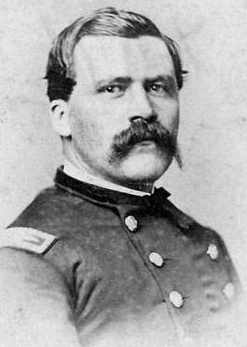Eli Long facts for kids
Quick facts for kids
Eli Long
|
|
|---|---|

Eli Long
|
|
| Born | June 16, 1837 Woodford County, Kentucky |
| Died | January 5, 1903 (aged 65) Plainfield, New Jersey |
| Place of burial |
Hillside Cemetery, Plainfield, New Jersey
|
| Allegiance | United States of America Union |
| Service/ |
United States Army Union Army |
| Years of service | 1856 - 1867 |
| Rank | |
| Commands held | 4th Ohio Cavalry 2nd Division, Cavalry Corps, Military Division of Mississippi |
| Battles/wars | American Civil War |
Eli Long (June 16, 1837 – January 5, 1903) was an important general in the Union Army during the American Civil War. He was known for his bravery and leadership. Long fought in many key battles and was wounded several times. He played a big role in the Union's success in the war.
Contents
Eli Long: A Civil War General
Early Life and Military Start
Eli Long was born in Woodford County, Kentucky, on June 16, 1837. He attended the Kentucky Military Institute and graduated in 1855. The next year, in 1856, he joined the United States Army. He became a second lieutenant, which is a junior officer rank.
Long served in the 1st U.S. Cavalry Regiment. He worked at different military outposts on the frontier. Sometimes, he even battled Native American groups. By March 1, 1861, he was promoted to first lieutenant.
Fighting in the Civil War
When the American Civil War began in 1861, Eli Long was ready to serve. On May 24, 1861, he became a captain in the 1st U.S. Cavalry. Later, he moved to the 4th U.S. Cavalry Regiment.
Long fought in the Western Theater of the American Civil War. This was a major area of fighting, mainly in states like Tennessee and Georgia. He was wounded in his left shoulder on December 31, 1862. This happened during the Battle of Stones River.
Leading the 4th Ohio Cavalry
In February 1863, Long was given a new command. He became a colonel of the 4th Ohio Cavalry. This group of soldiers had recently surrendered to a Confederate general named John Hunt Morgan. Long worked hard to improve the soldiers' spirits. He helped them feel proud and ready to fight again.
He led the 4th Ohio Cavalry in the Tullahoma campaign. This was a series of military movements in Tennessee. Long also commanded a larger group of cavalry (horseback soldiers). He led them in battles like the Battle of Chickamauga.
Wounds and Promotions
Eli Long was a very brave soldier. He was wounded five times during the war. On October 7, 1863, he was shot in his left side at the Battle of Farmington, Tennessee. He also fought in the Atlanta Campaign. This was a major Union effort to capture the city of Atlanta, Georgia.
During this campaign, Long was wounded again. He suffered a head wound at the Battle of Jonesborough on August 20, 1864. The very next day, at the Battle of Lovejoy's Station, he was wounded in his right arm and right thigh.
For his courage and excellent service, Long received special honors. He was given higher "brevet" ranks in the Regular Army. These were honorary promotions for his bravery in battle.
On August 18, 1864, President Abraham Lincoln promoted Long. He became a brigadier general in the volunteer army. This was a significant promotion, showing his leadership skills.
The Battle of Selma
From late 1864 to early 1865, General Long commanded the 2nd Division of the Cavalry Corps. This group was part of a large military operation led by Major General James H. Wilson.
On April 2, 1865, Long was severely wounded in the head. This happened during the Battle of Selma in Alabama. Despite his injury, he led his division in a brave charge. This attack helped the Union forces capture the town of Selma. This was a very important victory.
Throughout the Civil War, Eli Long was recognized five times for his gallantry. This means he was praised for his courage and daring actions. On January 13, 1866, he was nominated for another honorary promotion. He became a brevet major general of volunteers.
After the War
Eli Long left the volunteer army on January 15, 1866. However, he continued to receive honors for his service. On April 10, 1866, he was nominated for the brevet rank of brigadier general in the Regular Army. This was for his bravery at the Battle of Selma.
Later, on July 17, 1866, he was nominated for the brevet rank of major general in the Regular Army. This was to recognize all his services during the war.
After recovering from his wounds, Long was given command of the Military District of New Jersey. He retired from the U.S. Army on August 16, 1867, with the full rank of major general.
After his military career, Eli Long lived in Plainfield, New Jersey. He worked as a lawyer and a borough recorder, which is a type of local official. He passed away on January 5, 1903, after an operation in New York City. Eli Long is buried in Hillside Cemetery in Plainfield.
 | John T. Biggers |
 | Thomas Blackshear |
 | Mark Bradford |
 | Beverly Buchanan |

